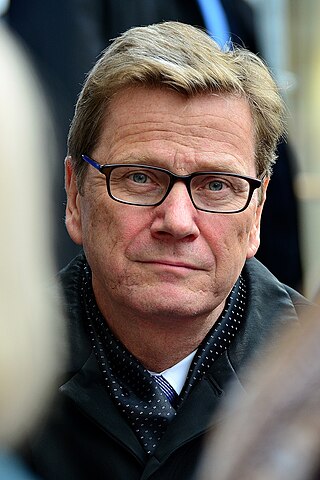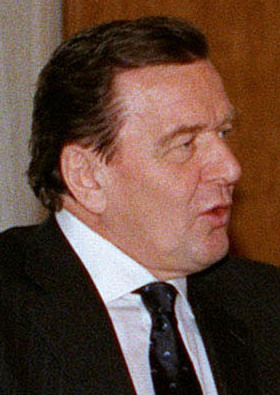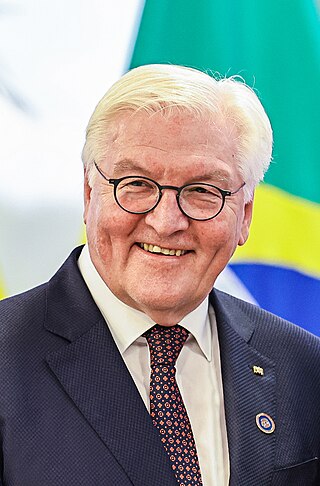
Germany is a democratic and federal parliamentary republic, where federal legislative power is vested in the Bundestag and the Bundesrat.

The member states of the United Nations comprise 193 sovereign states. The United Nations (UN) is the world's largest intergovernmental organization. All members have equal representation in the UN General Assembly.

Guido Westerwelle was a German politician who served as foreign minister in the second cabinet of Chancellor Angela Merkel and Vice-Chancellor of Germany from 2009 to 2011, being the first openly gay person to hold any of these positions. He also led the liberal Free Democratic Party (FDP) from 2001 until he stepped down in 2011. A lawyer by profession, he was a member of the Bundestag from 1996 to 2013. For his party he was also its first and so far only Chancellor candidate in the 2002 federal election, becoming also the youngest candidate for the office of Chancellor to date.

Joseph Martin "Joschka" Fischer is a German retired politician of the Alliance 90/The Greens. He served as the foreign minister and as the vice-chancellor of Germany in the cabinet of Gerhard Schröder from 1998 to 2005. Fischer has been a leading figure in the German Greens since the 1970s, and according to opinion polls, he was the most popular politician in Germany for most of the Schröder government's duration. Following the September 2005 election, in which the Schröder government was defeated, he left office on 22 November 2005. In September 2010 he supported the creation of the Spinelli Group, a europarliamentarian initiative founded with a view to reinvigorate efforts to federalise the European Union.

The "Weimar Triangle" is a regional alliance of France, Germany, and Poland created in 1991 in the German city of Weimar. The group is intended to promote co-operation between the three countries in cross-border and European issues.

Günter Verheugen is a German politician who served as European Commissioner for Enlargement from 1999 to 2004, and then as European Commissioner for Enterprise and Industry from 2004 to 2010. He was also one of five vice presidents of the 27-member Barroso Commission. After his retirement, he is now honorary Professor at the European University Viadrina in Frankfurt (Oder).

Klaus Kinkel was a German statesman, civil servant, diplomat and lawyer who served as the minister of Foreign affairs (1992–1998) and the vice-chancellor of Germany (1993–1998) in the government of Helmut Kohl.

Volker Rühe is a German politician of the Christian Democratic Union (CDU). He served as German Defence minister from 1 April 1992, succeeding Gerhard Stoltenberg during the first government of a reunified Germany in the fourth cabinet of Chancellor Kohl, to the end of the fifth Kohl Cabinet on 27 October 1998. During his time at the Defence Ministry Rühe played a central role in placing NATO enlargement on the German political agenda. He unsuccessfully ran for the office of minister-president of the German state Schleswig-Holstein in the year 2000, eventually losing against incumbent Heide Simonis.

Heidemarie Wieczorek-Zeul is a German politician and a member of the Social Democratic Party (SPD) since 1965.

Federal elections were held in Germany on 27 September 1998 to elect the members of the 14th Bundestag. The Social Democratic Party (SPD) emerged as the largest faction in parliament for the first time since 1972, with its leader Gerhard Schröder becoming chancellor. The Christian Democrats had their worst election result since 1949.

The G4 nations, comprising Brazil, Germany, India, and Japan, are four countries which support each other's bids for permanent seats on the United Nations Security Council. Unlike the G7, where the common denominator is the economy and long-term political motives, the G4's primary aim is the permanent member seats on the Security Council. Each of these four countries have figured among the elected non-permanent members of the council since the UN's establishment. Their economic and political influence has grown significantly in the last decades, reaching a scope comparable to the permanent members (P5). However, the G4's bids are often opposed by the Uniting for Consensus movement, and particularly their economic competitors or political rivals.

Reinhard Hans Bütikofer is a German politician who has been serving as a member of the European Parliament since 2009. He is a member of the Alliance 90/The Greens, part of the European Green Party. He was the co-chair of Alliance 90/The Greens from 2002 to 2008 and of the European Green Party from 2012 to 2019.

Frank-Walter Steinmeier is a German politician serving as president of Germany since 19 March 2017. He was previously federal minister of foreign affairs from 2005 to 2009 and again from 2013 to 2017, as well as vice chancellor of Germany from 2007 to 2009. Steinmeier was chairman-in-office of the Organization for Security and Co-operation in Europe (OSCE) in 2016.

Reform of the United Nations Security Council (UNSC) encompasses five key issues: categories of membership, the question of the veto held by the five permanent members, regional representation, the size of an enlarged Council and its working methods, and the Security Council-General Assembly relationship. The Member States, regional groups and other Member State interest groupings developed different positions and proposals on how to move forward on this contested issue.

France has been a member of the United Nations (UN) since its foundation in 1945 and is one of the five countries, alongside China, Russia, the United Kingdom, and the United States, that holds a permanent seat on the United Nations Security Council (UNSC), which is responsible for maintaining international peace and security.

Gerhard Fritz Kurt "Gerd" Schröder is a German lobbyist and former politician, who was the chancellor of Germany from 1998 to 2005. From 1999 to 2004, he was also the Leader of the Social Democratic Party of Germany (SPD). As chancellor, he led a coalition government of the SPD and Alliance 90/The Greens. Since leaving public office, Schröder has worked for Russian state-owned energy companies, including Nord Stream AG, Rosneft, and Gazprom.

The Second Schröder cabinet was the 19th Government of Federal Republic of Germany in office from 22 October 2002 until 22 November 2005. It succeeded the First Schröder cabinet formed after the 2002 elections. Chancellor Gerhard Schröder, continue the coalition with the Alliance 90/The Greens (Greens) and his Social Democratic Party (SPD). Joschka Fischer (Greens) served as Vice Chancellor of Germany and Federal Minister of Foreign Affairs. The cabinet was succeeded by the First Merkel cabinet following the 2005 elections.

The history of Germany from 1990 to the present spans the period following the German reunification, when West Germany and East Germany were reunited after being divided during the Cold War. Germany after 1990 is referred to by historians as the Berlin Republic. This time period is also determined by the ongoing process of the "inner reunification" of the formerly divided country.

The role of the Ambassador and Permanent Representative of Germany to the United Nations is as the leader of the German delegation to the United Nations in New York City and as head of the Permanent Mission of the Federal Republic of Germany to the UN. The position has the rank and status of an Ambassador Extraordinary and Plenipotentiary and is also the representative of Germany in the United Nations Security Council.

Democratic Federal Yugoslavia was a charter member of the United Nations from its establishment in 1945 as the Socialist Federal Republic of Yugoslavia until 1992 during the Yugoslav Wars. During its existence the country played a prominent role in the promotion of multilateralism and narrowing of the Cold War divisions in which various UN bodies were perceived as important vehicles. Yugoslavia was elected a non-permanent member of the United Nations Security Council on multiple occasions in periods between 1950 and 1951, 1956, 1972–1973, and 1988–1989, which was in total 7 years of Yugoslav membership in the organization. The country was also one of 17 original members of the Special Committee on Decolonization.


























